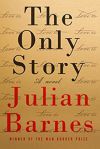Readers of Julian Barnes may recognize in his new novel The Only Story, a similar chapter layout to that of his Man Booker Prize award-winning novel, The Sense of an Ending. The latter was narrated by main character Tony Webster, who reflects on his past and the friends who were present throughout his life. The story takes place in the 1960’s, and is divided in two parts, adequately named “One” and “Two.”
In The Only Story, the narrator Paul is a now older man who thinks about the love story that changed his life. The novel is divided into three parts with only Paul’s pov, which may seem to limit the outlook of the story, but we soon figure out the reasoning beyond it.
Paul’s narrative begins at the point when he is a 19 year old college student visiting his parents while on vacation from college. Like in The Sense of an Ending, the time is the 1960’s, but in place of Cambridge or Bristol, Paul’s parents live in a small South London suburb, with nothing in the way of excitement beyond the tennis club and occasional cocktail parties.

Badgered by his mother to join the tennis club, Paul is paired in a doubles tennis match with Mrs. Susan Macleod, a married mother of two daughters and 29 years Paul’s senior. They become lovers almost astoundingly fast, but if you think Barnes’ intention is to portray the sexual acrobatics between a younger inexperienced man and a voracious older woman, this is not that story.
In fact, Paul and Susan’s sexual encounters are not mentioned in much detail, forfeited instead for Paul’s shameless presence at Susan’s dinner table with her family sitting between them, including Susan’s often stone-faced husband.
Paul’s lack of guilt in the presence of Susan’s family perhaps shouldn’t be judged too harshly, and certainly not under the scope of adulthood. Youth is more often than not irresponsible, selfish and eternally optimistic and Paul fits right in with what could be expected of someone his age.
Don’t expect Barnes to dissect the revolutionary changes of the 60s or any kind of social commentary that could reside alongside it either. As Paul himself says: “The time, the place, the social milieu? I’m not sure how important they are in stories about love…this isn’t one of those stories.”
And surely Paul has a point? Not every story set in a controversial area is in need of a profound sociological study. Isn’t the primary responsibility of a writer mainly to write a good story? Whether that eventually garners the story to be the lens in exploring a certain era, in this case 1960s Britain, is up to the writer. But sometimes the time is just time. A background is just a background. And not everything has to have a secondary meaning. If you’re looking for that in this novel, you may be in want of a different plot.
In regards to Susan and the apparent cavalier way in which she seems to take on a lover who is younger than her daughters, might be judged as typical “desperate housewife” behavior. But let’s not pass sentence just yet. While it may be tempting to either condemn Susan for her adultery or to commend her for her audacity, both actions would be premature. With only Paul’s voice narrating the story, we are constricted by his view of things which are extraordinarily limited by his youth and naiveté.
As Susan and Paul’s relationship progresses to the point of her leaving her family and both setting up a home of sorts in London, things are by no means easier. Susan carries behavior patterns acquired during years of enduring an abusive husband and a stale life, and while she sees Paul as her savior, she isn’t free of her past.
In the present time, Paul’s memories of Susan and their time together are complicated, his reflections of his life with her are a mixed bag of gaps, fondness and despair. He finds that he can’t remember certain things that should be important, such as who kissed who first or whether Susan ever had an orgasm.
Instead Paul remembers her tennis game, the shape of her ears and her catch phrases. He also recalls the point when their relationship started to deteriorate, how they began to pull away from each other, how he was there for her wholeheartedly even though the love that brought them together changed and shifted until it became unrecognizable to them both.
The Only Story is not Julian Barnes’ saucy tale of the affair between an older woman and a younger man during a decade that screamed sexual revolution. It is a story of love, of the optimism of youth, of the beginning of a love and how it eventually changes. As Paul puts it: “Who can control how much they love? If you can control it, then it isn’t love. I don’t know what you call it instead, but it isn’t love.”
The Only Story is a love story, and it must be read as such. To look at it from any other way, would be to miss its point entirely.
 Blogcritics The critical lens on today's culture & entertainment
Blogcritics The critical lens on today's culture & entertainment




